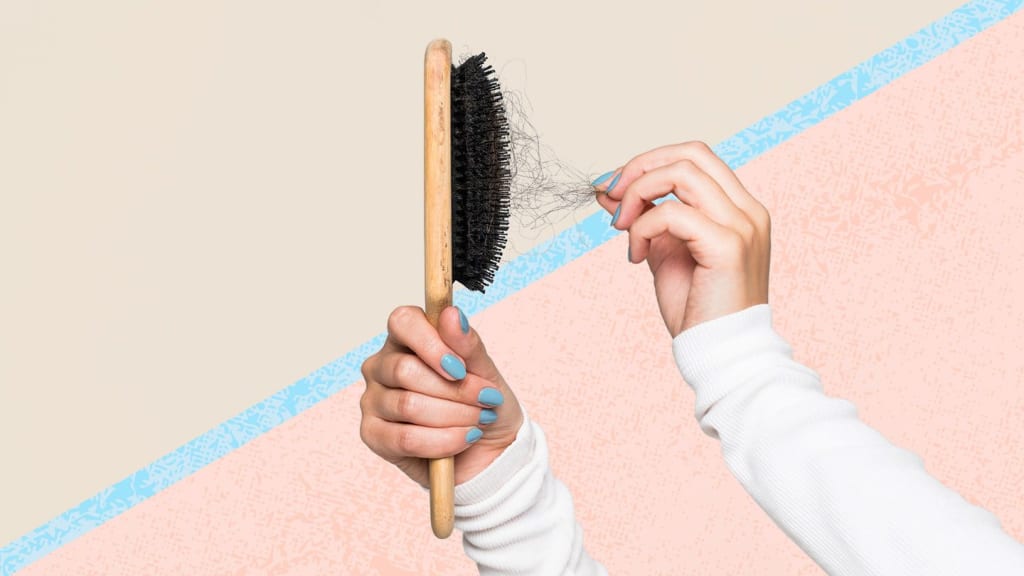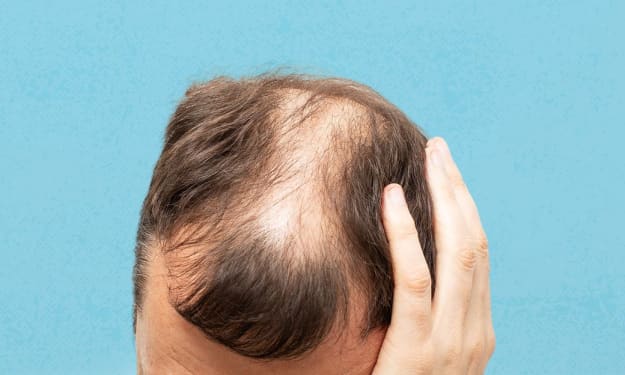11 Potential Causes of Hair Loss and Baldness
Read the article to find out!

Are you ready to unlock the mysteries that lie beneath thinning hair and baldness? Prepare yourself, my friend, for I am Gary Halbert, the legendary copywriter renowned for my unrivaled ability to sell anything to anyone. I have embarked upon a quest to unravel the enigma of hair loss, guiding you on a journey toward renewed growth and confidence. Trust in me, for I shall bestow upon you the wisdom that will make your blog post the beacon of trust for all who seek answers.
Before continuing to read the article we would like to offer you a totally FREE E-Book about Hair Loss and how to stop it. Follow this link to get it!
Let us venture forth and explore the myriad of causes behind hair loss. It is not a singular nemesis but a multifaceted battle that demands our attention.
- Hormonal Imbalances Ah, the delicate dance of hormones! Excess androgens, those mischievous male sex hormones, are often the culprits behind hair loss. Dr. Michele Green, the esteemed cosmetic dermatologist, reveals the secret. Androgens can weaken hair follicles, leading to excessive shedding and even female-pattern baldness. But wait, there’s more! Estrogen-related changes, such as birth control use or menopause, can exacerbate the sensitivity to androgens, further fueling the hair loss saga. And let us not forget our male comrades, for an androgen known as dihydrotestosterone (DHT) takes center stage in male pattern baldness. DHT not only binds to hair follicles, stifling growth, but also shortens the hair’s lifespan, plunging us into the realm of androgenetic alopecia. But there’s more to this tale, my friends! Certain medical conditions, from high blood pressure to heart disease, prostate cancer to polycystic ovary syndrome (PCOS), may conspire to trigger this form of hair loss. The battlefield is complex, intertwined with the intricate dance of hormones.
- Thyroid Problems Behold the influence of the mighty thyroid! An underactive or overactive thyroid can throw our hair growth cycles into disarray, for these conditions create hormonal imbalances. The Cleveland Clinic sheds light on the matter, explaining how autoimmune diseases of the thyroid gland, such as Hashimoto’s thyroiditis and Graves’ disease, can disrupt the harmony, leading to hair loss. Fear not, my comrades, for the right treatment shall restore order to the hormonal realm, putting an end to hair loss and heralding the resurgence of your glorious mane.
- Pregnancy Ah, the wonders of pregnancy, a journey both beautiful and transformative. Yet, amidst this miraculous time, hormonal fluctuations run wild. Green unveils the secret, sharing that postpartum hair loss affects a staggering 40 to 50 percent of women who have recently given birth. During pregnancy, estrogen levels soar, bestowing upon us a respite from the clutches of excessive hair loss. But as the estrogen levels return to normal, a greater shedding may commence, leaving some new mothers with thinning hair or patches of baldness. Fear not, for this is but a temporary phase. As your body recovers, so shall your hair follicles. Embrace the patience within you, my friends, for the hair loss shall fade away, and your glorious mane shall rise anew.
- Certain Medications Beware, for the battle against hair loss may be an unexpected side effect of common medications. The American Hair Loss Association warns us of the treacherous path known as “drug-induced hair loss.” Blood-thinning medications, oral contraceptives, drugs for depression, anti-inflammatories, and beta and calcium channel blockers lurk within the shadows, ready to unleash thinning hair and baldness upon unsuspecting victims. Even the revered vitamin A, when consumed in excess, may lead to hair loss. But fret not, my friends, for as you cease the consumption of these medications, your hair shall rise from the ashes once more. Seek the counsel of a doctor, for they shall guide you on your path to recovery.
- Various Types of Alopecia Areata (AA) Behold, the term “alopecia” echoes through the halls of hair loss. Within its embrace, we find a multitude of autoimmune conditions that lay siege to our hair follicles. Alopecia areata, my friends, stands as a testament to this battle. The immune system turns upon itself, ravaging our hair follicles and impeding the growth of new hair. The American Academy of Dermatology Association illuminates the truth, revealing that this autoimmune condition may manifest as thinning hair, patches of hair loss, or even total baldness. It may be a temporary plight or a permanent one. Fear not, for treatments await. Seek the wisdom of your doctor, for they hold the keys to unlock the path to restoration.
- Other Autoimmune Diseases Alopecia areata is but one warrior in the vast army of autoimmune diseases that threaten our hair. Hashimoto’s thyroiditis and lupus stand as formidable opponents, capable of inflicting hair loss upon us. DermNet NZ enlightens us, revealing that this form of hair loss may not always be reversible. Yet fear not, for science and medicine have devised medications and hair restoration surgeries to compensate for our losses. Do not despair, my friends, for there is hope amidst this tumultuous battle.
- Physical Trauma Sometimes, life deals us a severe blow, a physical trauma that reverberates through our bodies and minds. Penn Medicine unveils the truth, exposing the aftermath of shock and the disruption it brings to our hair growth cycles. Up to 50 to 75 percent of our hair may fall out in response to a severe accident, surgery, burns, or a grave illness. This phenomenon, known as telogen effluvium, may haunt us for months after the initial event. But fret not, my friends, for as time heals our wounds, our hair shall once again grace us with its presence. Seek treatment for the underlying infections or illnesses, for they are the key to restoring your glorious mane.
- Stress Ah, stress, that relentless adversary that lurks within the shadows. Green reveals its treacherous nature, exposing the profound impact it can have on our hair. Intense stress, whether triggered by illness or surgery, can send up to 70 percent of our hair follicles into a resting state, disrupting the natural hair growth cycle. Even the infamous COVID-19, my friends, may cause hair loss through stress rather than the disease itself, as confirmed by the AAD. Fear not, for this too shall pass. As stress is brought under control, our hair shall regrow, and the harmony of our follicles shall be restored. Seek the aid of a dermatologist, for they shall guide you toward treatments that stimulate hair growth, such as minoxidil (Rogaine) or platelet-rich plasma (PRP).
- Trichotillomania Ah, trichotillomania, a battle fought within the depths of our minds. This mental health condition, intertwined with obsessive-compulsive disorder and anxiety disorders, compels us to pull at our hair. Mayo Clinic reveals its grip, describing the pleasure or relief we experience as the hairs yield to our hands. Alas, this battle leaves noticeable patches of hair loss in its wake. Fear not, for there are treatments that can aid us. Cognitive-behavioral therapy and habit reversal training shall provide the tools to combat this condition. Together,we shall break free from the chains of trichotillomania and embrace healthier coping mechanisms. Though no medications are approved solely for this condition, certain antidepressants or antipsychotics may provide relief.
- Nutrient Deficiencies Ah, the power of nourishment! Green unveils the truth, exposing the vital role that vitamins and minerals play in our hair growth cycle and cellular turnover. Inadequate protein, biotin, zinc, and iron can all contribute to hair loss, warns the AAD. But fear not, for a balanced and nutritious diet shall replenish the stores of these essential nutrients, fostering healthy hair growth. Before reaching for supplements, consult with a doctor to determine if true deficiencies exist. Let us remember, my friends, that a healthy diet has its limitations. Genetic factors may still influence hair loss, but let us nourish our bodies and give our hair the best chance to thrive.
- Extreme Hair Care Beware, my comrades, for our quest for a stylish mane may lead us down a treacherous path. The American Academy of Dermatology Association cautions against the perils of excessive hair care. Frequent shampooing, excessive blow-drying, heated styling tools, tight hairstyles, and vigorous scalp rubbing may all contribute to hair loss and breakage. Perms, relaxers, and hair dyes may also inflict damage upon our precious locks. Seek gentle and mild hair care products, my friends, to shield our tresses from unnecessary harm.
In conclusion, my brave warriors, hair loss is a battle fought on multiple fronts. Hormonal imbalances, medical conditions, medications, autoimmune diseases, physical trauma, stress, nutrient deficiencies, and extreme hair care all play their parts. But fear not, for knowledge is our greatest weapon. Seek the guidance of dermatologists and doctors, for they possess the wisdom to navigate this tumultuous battlefield. Together, we shall uncover the secrets to reclaiming our crowning glory, embarking on a journey toward renewed growth and confidence. Trust in the power of knowledge, my friends, for it shall be our guide in this epic battle against hair loss.
GET YOUR FREE E-BOOK ON HAIR LOSS NOW: CLICK HERE






Comments
There are no comments for this story
Be the first to respond and start the conversation.